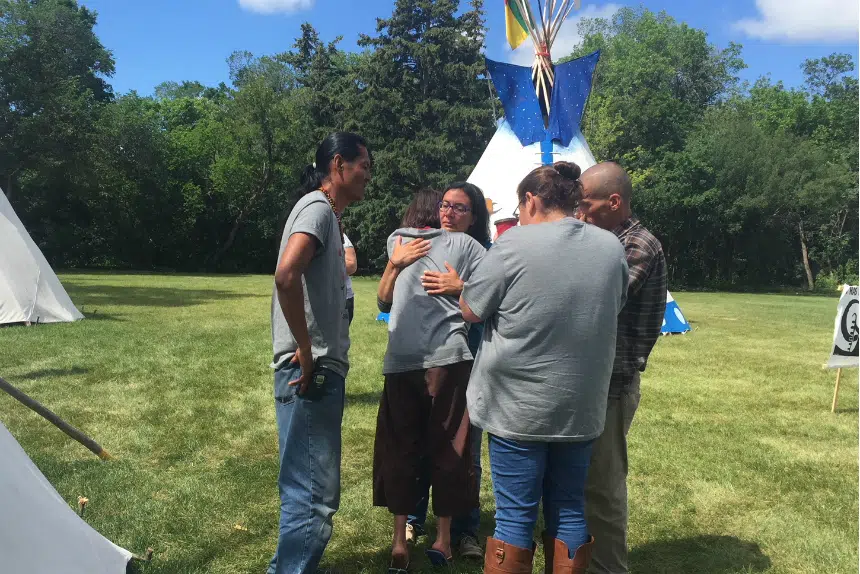The Justice for our Stolen Children Camp got the meeting they’ve been waiting for on Monday, but they said they’re staying put for the next two weeks waiting for a possible followup meeting.
At the meeting, the group mainly asked the government to work on fixing the high adoption rates of Indigenous children and to make further inquiries into deaths and police practices. The government said it’s working on these initiatives.
“We are past the first step. That’s all,” said protestor Prescott Demas. “I’m happy that we’re past the first step, but really it took this long just to get a meeting.”
He added they asked the government to leave the camp alone.
Protestor Prescott Demas tells us he’s happy they had the opportunity to take this first step in seeing change for Indigenous peoples, but there’s much more work to be done. #yqr #Sask #skpoli pic.twitter.com/cQjDArKVIn
— Jayda Noyes (@jaynoyesSK) July 3, 2018
Speaking to reporters on Tuesday, Justice Minister Don Morgan said he wants to see the camp taken down and noted there hasn’t been a lot of discussion about potential further meetings with the group.
“I think if they want to have a further meeting, as their group, they need to show some good faith and call for the teepees to be taken down,” Morgan said. “It’s been a particular challenge to meet with a group of people that won’t come into the Leg building.”
Morgan said moving forward, the government plans to use the partnership with tribal councils and the Federation of Sovereign Indigenous Nations (FSIN) to work on fixing systemic issues, like foster care.
He said the province currently has 17 agreements with bands across Saskatchewan regarding foster care and about four or five more in the works. These agreements say if a child needs protection, the band themselves will care for the child or social services will under the band’s supervision.
Robyn Pitawanakwatt with the camp spoke in depth about issues of adoption for Indigenous children.
“What we need is for Indigenous families to be raising their children. Children are being adopted out for reasons of poverty and removed from their family homes because of poverty and that needs to stop. I’m not saying that any adoptions can never happen again, but the amount of adoptions that are happening and the reasons why they’re happening are not okay,” she said.
At the meeting, the group presented a list of specific requests, including a temporary ban on adoptions of Indigenous children.
“The system as its functioning now is not working for anyone,” she said. “There needs to be changes to these systems and we’re asking for them, we’ve given direction on how we see those changes need to happen, and we’re hoping to see (responses) within the next couple of weeks.”
Pitawanakwatt said she’s happy with how the meeting went, but there are other stories they weren’t able to share.
“For each one of those individuals that makes it a systemic issue, there’s trauma, and there is pain and there is loss,” she said.
While the group continues to plan and call for followup discussions, the province has not agreed to another meeting at this time.
–With files from 650 CKOM’s Keenan Sorokan







